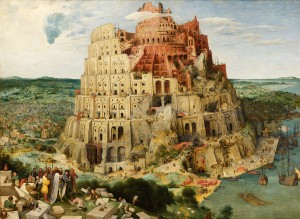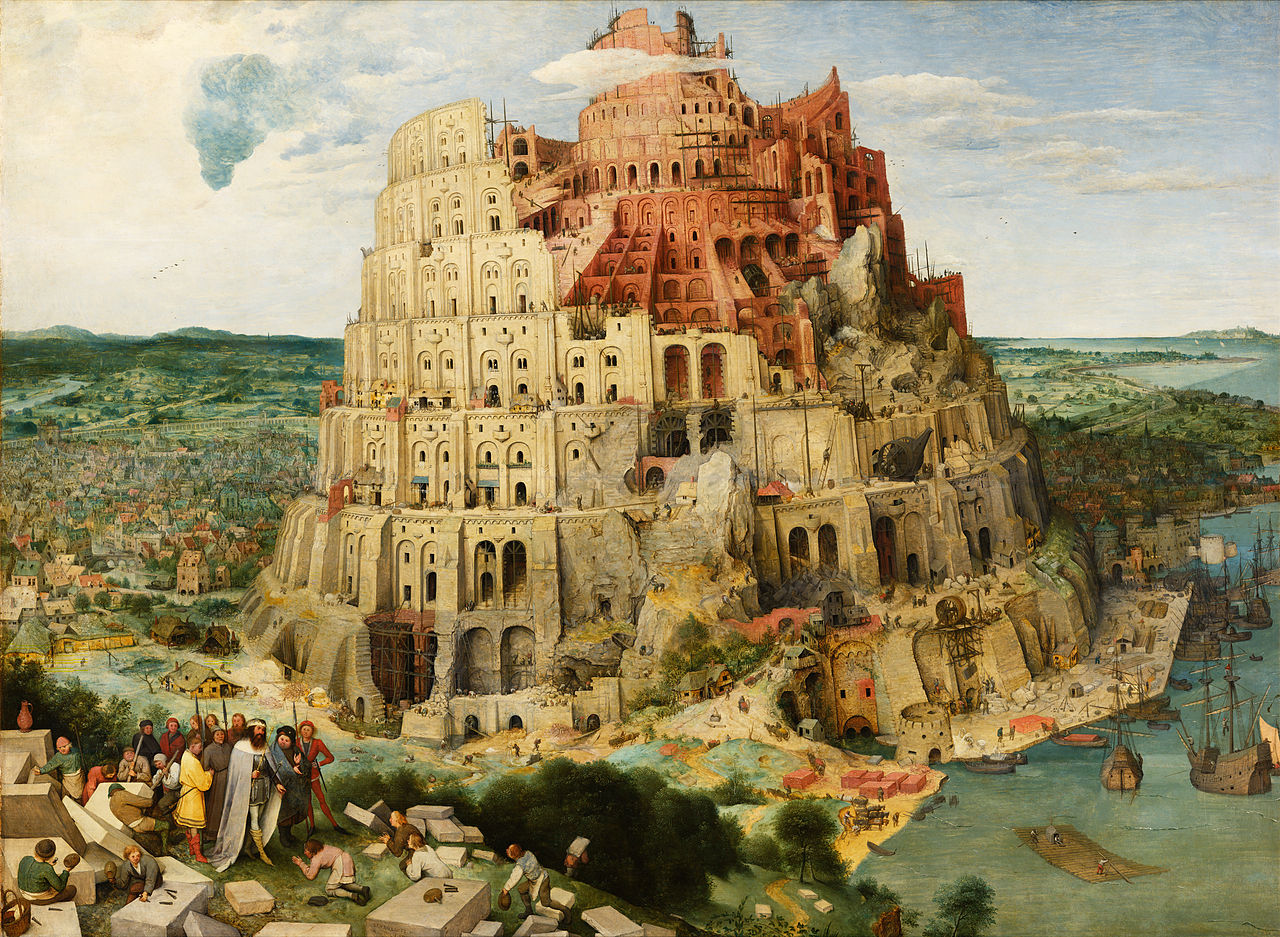 In this episode, the Mormon Matters “Genesis Team”–David Bokovoy, Tom Roberts, and Brian Hauglid–share good, fair, and scholarly framings of two difficult biblical stories: (1) the cursing of Canaan, Ham’s son, to become a servant to the races descending from Noah’s other two sons because of his Ham’s indiscretions upon discovering Noah naked within his tent; and (2) the Tower of Babel and God’s confounding of human languages. There is so much more going on in the Genesis text than typically gets discussed in LDS devotional settings. This episode also folds in sections of the Book of Abraham and Book of Mormon in sidebar discussions of the link between the cursing of Canaan and black skin and priesthood cursing that had been in Mormon consciousness for such a long time and has only recently been formally denounced by the church, and also about the idea that there once was a pure, Adamic language toward which we are to somehow seek,
In this episode, the Mormon Matters “Genesis Team”–David Bokovoy, Tom Roberts, and Brian Hauglid–share good, fair, and scholarly framings of two difficult biblical stories: (1) the cursing of Canaan, Ham’s son, to become a servant to the races descending from Noah’s other two sons because of his Ham’s indiscretions upon discovering Noah naked within his tent; and (2) the Tower of Babel and God’s confounding of human languages. There is so much more going on in the Genesis text than typically gets discussed in LDS devotional settings. This episode also folds in sections of the Book of Abraham and Book of Mormon in sidebar discussions of the link between the cursing of Canaan and black skin and priesthood cursing that had been in Mormon consciousness for such a long time and has only recently been formally denounced by the church, and also about the idea that there once was a pure, Adamic language toward which we are to somehow seek,
Please listen in and come to better understand the writers and their worldviews and intentions. Then share your thoughts!
________
Links:
David M. Goldenberg, The Curse of Ham: Race and Slavery in Early Judaism, Christianity, and Islam
Lester E. Bush and Armand L. Mauss, eds., Neither White Nor Black: Mormon Scholars Confront the Race Issue in a Universal Church, Signature Books Online Library. Includes the Armand Mauss article mentioned in this episode, “The Fading of the Pharaoh’s Curse: The Decline and Fall of the Priesthood Ban against Blacks in the Mormon Church”)
Samuel Brown, “Joseph (Smith) in Egypt: Babel, Hieroglyphs, and the Pure Language of Eden,” Church History (March 2009)
Jerry Bradshaw, “Genesis 11: The Tower of Babel,” templethemes.net.
David Bokovoy, Authoring the Old Testament (Kofford Books, 2014)
The Jewist Bible: Tanakh (Jewish Publication Society translation)
Father Tom Roberts, “Sacral Kingship of Christ,” Facebook page with links to his various writings, videos, etc.


Comments 5
What do you think about the “stolen garment” narrative from the LDS old testament Institute manual.
Genesis 9:20–27. Why Did Noah Curse Canaan in This Event When He Was Not Even Present?
The account of Noah’s “nakedness” and the role his sons played in the event is a puzzling one, especially the part in which Noah awakens and pronounces a curse upon Canaan, the son of Ham (see Genesis 10:6), who does not even seem to be present at the time.
Most members of the Church are aware that a priesthood garment, symbolic of the covenants made in the temple, is worn by those who have participated in the endowment ceremony in the temple. This garment is a representation of the coat of skins made by the Lord for Adam and Eve after the Fall (see Genesis 3:21; Moses 4:27). The idea of a garment made of skins that signified that one had power in the priesthood is found in several ancient writings.
Hugh Nibley discussed some of these ancient writings and their implications for the passage in Genesis:
“Nimrod claimed his kingship on the ground of victory over his enemies [see Genesis 10:8–10; Reading 4-21]; his priesthood, however, he claimed by virtue of possessing ‘the garment of Adam.’ The Talmud assures us that it was by virtue of owning this garment that Nimrod was able to claim power to rule over the whole earth, and that he sat in his tower while men came and worshiped him. The Apocryphal writers, Jewish and Christian, have a good deal to say about this garment. To quote one of them: ‘the garments of skin which God made for Adam and his wife when they went out of the garden and were given after the death of Adam … to Enoch’; hence they passed to Methuselah, and then to Noah, from whom Ham stole them as the people were leaving the ark. Ham’s grandson Nimrod obtained them from his father Cush. As for the legitimate inheritance of this clothing, a very old fragment recently discovered says that Michael ‘disrobed Enoch of his earthly garments, and put on him his angelic clothing,’ taking him into the presence of God. …
“Incidentally the story of the stolen garment as told by the rabbis, including the great Eleazer, calls for an entirely different rendering of the strange story in Genesis [9] from the version in our King James Bible. They seemed to think that the ’erwath of Genesis [9:22] did not mean ‘nakedness’ at all, but should be given its primary root meaning of ‘skin covering.’ Read thus, we are to understand that Ham took the garment of his father while he was sleeping and showed it to his brethren, Shem and Japheth, who took a pattern or copy of it (salmah) or else a woven garment like it (simlah) which they put upon their own shoulders, returning the skin garment to their father. Upon awaking, Noah recognized the priesthood of two sons but cursed the son who tried to rob him of his garment.” (Lehi in the Desert and the World of Jaredites, pp. 160–62.)
Therefore, although Ham himself had the right to the priesthood, Canaan, his son, did not. Ham had married Egyptus, a descendant of Cain (Abraham 1:21–24), and so his sons were denied the priesthood.
Thanks, Marco. The stolen garment motif derives from later Jewish legends, including the very late Rabbinic work “The Book of Jasher.” Thought interesting, these ideas are quite foreign to the original text.
http://youtu.be/cDUGrUFdc5E
In the book Stolen Legacy by George GM James, you’ll find the first ever system of Salvation, The Pharaonic Kemetic Mystery System, was taken into Greece after the Alexander conquest and many of the Great Greek Philosphiers who took credit for the knowledge of the Ancients and taught this knowledge in Greece were killed or exiled for teaching what they called foreign then . Later after all the High Kemetic Priest of this knowledge were killed, the books were carried away and hidden in museums of Europe and the knowledge of the Ancients is guarded by Secrect Societies today and the people left blind and conquered until the Savor return and acknowledge the true people. When the Frence invaded Timbutu, they knew what happened to Kimet so they took their books out of their Ancient libraries and hid them in the Ground, books older than the Moses and the Torah. Today there are Orthodox Jews recearching the past of these Hebrew Israelite Yahudi people of Mali and trying to sell them, the original people their Talmud and Jewish religion.
My life gets rather busy–really, really busy. I wish I posted my comment last week when I listened to this podcast, but oh well, better late than never. My comment therefore is short.
Has anyone other than myself found the description of the brother of Jared praying that his family and friends’ language not be confounded to be a little odd? This can be found specifically in Ether 1:33-37. I mean, did he and Jared know ahead of time that the language was going to be confounded? Or did it already happen, and they were praying to un-confound their language?
I suppose that if there had been a prophecy (of community knowledge) predicting the thing, that would be the explanation. There is no record of such a thing however. Any thoughts?
Terry, that’s a great point. Thanks for sharing. I hadn’t noticed that before. That certainly is odd.